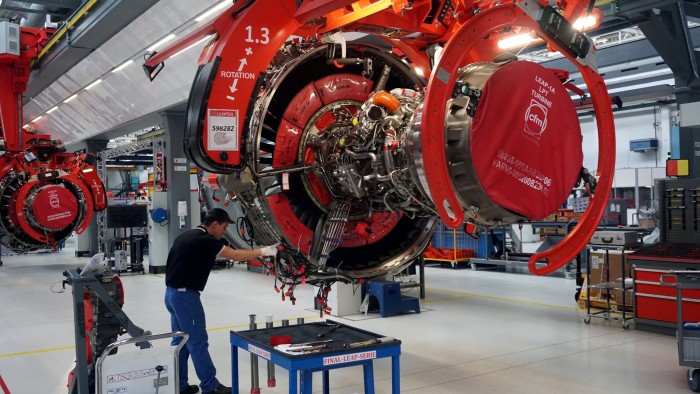Unlock the Editor’s Digest for free
Roula Khalaf, Editor of the FT, selects her favourite stories in this weekly newsletter.
Safran warned that a US rift with China would hit the global aerospace market, as shares in the French jet engine maker dropped 5 per cent on the back of lacklustre mid-range targets.
Chief executive Olivier Andriès told journalists on Thursday that it was in “no one’s interest to have a decoupling” with Beijing, following US president-elect Donald Trump threats to raise tariffs on Chinese imports.
“China is still 20 per cent of the global aeronautics market and therefore it is a market that is very important for Airbus, for Boeing and for the entire global aeronautics sector,” he said, speaking ahead of the company’s capital markets day. “Ask the boss of Airbus or the boss of Boeing, and they will say the same thing.”
Chinese airlines are large customers of both Airbus and Boeing aircraft and represent a significant market for future growth. Analysts have previously said a US trade war with Beijing could impact Boeing in particular if retaliatory tariffs were to be imposed.
Higher tariffs could also have an impact on the aerospace industry’s tightly integrated supply chain, which has struggled to recover following the Covid pandemic. Safran is among businesses to face supply constraints of raw materials as well as labour shortages.
Andriès also warned that “political and economic uncertainty” in France would affect the defence sector, which had been due to receive more funding under Michel Barnier’s budget plans but now will come under “pressure”, after parliament on Wednesday voted to oust the former Brexit negotiator.
His warnings came as the jet-engine maker issued lower than expected financial targets for 2028, despite benefiting from higher defence budgets and more air traffic, sending shares down on Thursday.
The company forecast 10 per cent revenue growth in 2025 and operating income of between €4.7bn and €4.8bn. But midterm guidance for recurring revenue of €6bn to €6.5bn by 2028 was “exceptionally conservative” and well below analysts’ expectations, said Milene Kerner, an analyst at Barclays.
Shares in the company have risen 36 per cent this year despite facing production constraints. Aero engine makers have benefited from strong “after market” demand for their maintenance services as airlines have been flying older aircraft for longer given delays in the deliveries of newer models.
Andriès said the business would continue to benefit from increased geopolitical tensions.
“We have leading positions in markets that are buoyant and growing faster than global GDP,” he said, adding that was the case for “civil aviation, where we have very high visibility” and also for “defence, where global defence spending has of course reached a record level in 2023”.
He said defence spending was also likely to continue to rise due to “geopolitical tensions”.
Asked about the cautious approach to the targets for 2028 and fall in share price, Pascal Bantegnie, chief financial officer, said the company had significantly surpassed its previous targets. “If the future is rosier than we think, so much the better. But today, investors think that everything will be rosy forever,” he added.
The company predicted rising demand for its Leap engines, which it co-produces with GE Aerospace as part of its CFM International joint venture, and which power both Airbus and Boeing aircraft. It also expects continued income from services on its older CFM 56 engines, which are used in half of medium-haul aircraft globally, Andriès added.
In defence, Andriès said the company had already made 1,000 engines for 500 Rafale fighter jets produced by French company Dassault Aviation and expected a “ramp-up” in the second part of the decade.
Safran kept its financial guidance for this year unchanged. The company in October lowered its revenue expectations for this year amid supply chain bottlenecks that have impacted deliveries of Leap engines.
The engine manufacturer has previously said deliveries would be about 10 per cent below last year’s level. The lower deliveries have impacted Airbus, which is trying to ramp up output aggressively over the coming years.
Read the full article here

